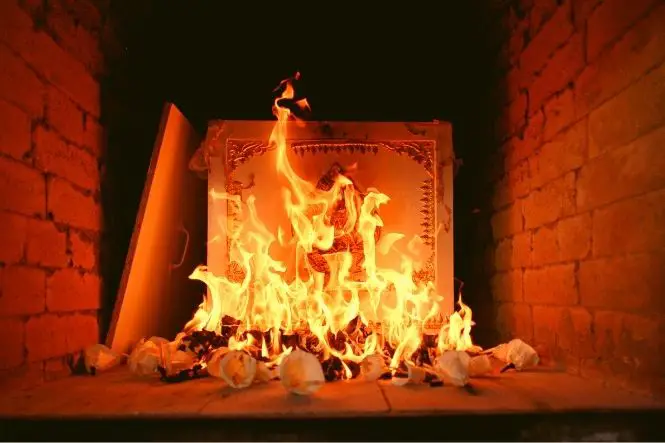At stressful times the difference between burial, funerals and cremations can seem a world away from normal life, when the modern image of the funeral is one where everyone is dressed in black, formal clothing and cremation inspiring images of viking ships being set alight we thought it would be best to give you the low down on what is the difference between a cremation and a burial.
The difference between burial and cremation is the way in which a deceased body is laid to rest. A burial is when the deceased is laid to rest in the ground, typically in a cemetery. Cremation is when the body is subjected to high heat, reducing the deceased to bone fragments and ash. A funeral is a ceremonial procession used to celebrate one’s life.
Each of these will vary by culture and geographical location, with some rituals dating back as far as written records have existed. Keep reading to learn about each term and some history behind each one.
What is the purpose of a funeral?
There are several reasons that funerals are held. These vary by culture and religion but all are similar in nature. It is important for loved ones to gather at funerals in support of each other and to move along in the grieving process.
Accepting the reality of what has happened
It is quite natural to not want to accept the reality of losing a loved one. It is human nature to not think about death while living our day-to-day lives. When death does occur, it brings our minds to a place of sorrow and reminds us that death is a real event we all must face.
Beginning the Grieving process
The acceptance of death is the first stage of grievance. Until we accept that our lost loved one is gone forever we cannot begin moving on. This is one of the main reasons we hold a funeral and gather together to lay the deceased to rest.
Support of others
Everyone grieves differently and in different stages. When gathering for a funeral, we are lending an ear and warm shoulder to cry on. It is common that without this ceremony, friends remain distant, assuming the family would rather grieve in private.
Strength in faith
Regardless of religion, a loved one’s death tends to make us question our own mortality. Gathering together will help us face the event rather than suppress our feelings. This is where we find the strength needed to move forward with the healing process
Why do we bury the deceased?
The burial process gives loved one’s closure and a place to come to remember the one we lost. In a very simple sense, we bury the deceased to prevent loved ones from having to witness the decay of the body.
Some religions and cultures equate burial with moving on of the spirit to the afterlife. There are different rituals performed throughout history and across different geographical places. Each of these serves a specific purpose and varies greatly.
Why do some choose cremation?
Some reasons cremation is chosen over burial are cost, religion, and ecological reasons.
Cremation is cheaper than burial because there is no casket and no land space to occupy. Some religions require that the deceased be cremated. Other people choose cremation while alive because of their ecological beliefs. Cremation does not take up landmass, therefore leaving fewer biological footprints.
Cultural observances
In some places, water burial is the chosen method of laying a loved one to rest. They are set afloat or tossed into a body of water often seen as giving the body back to the source of sustenance they receive their food and way of life from.
Some places will hold a parade through the streets while rejoicing in the life of the dearly departed. These hold different histories and purposes that are sometimes religious and other times as a way of remembering the deceased.
In some cultures, the body is placed in the open to be devoured by animals and scavengers. This is often seen as a way of giving back to the circle of life and moving into the afterlife in a most natural way.
What happens at a funeral?
At a funeral, people gather together to lay to rest somebody who has passed away. Sometimes funerals are held to assist in the grieving process. Many religions see this ritual as the process of passing on to the afterlife.
Each culture holds this event in different forms and by different methods. It is safe to say that regardless of how or why these methods vary, they assist in the closure needed to move forward in the event of a loved one being lost.
Conclusion
While both Burial and cremation are methods of disposition of a loved ones body after death. Each culture has a different way of holding these rituals but all hold a symbolic purpose.
A funeral is the ceremonial gathering of loved ones where memories are shared and emotional support is given. These can be done in private, public, or sometimes held at a national level such as when a public figure is the one being laid to rest.


